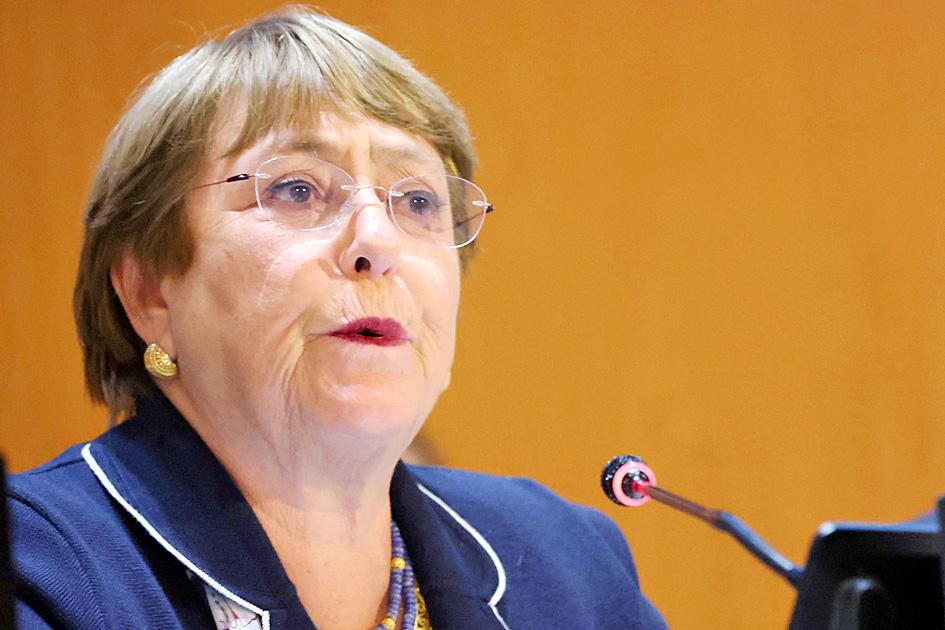UN High Commissioner for Human Rights Michelle Bachelet arrived in China yesterday, the first trip by a holder of the office since 2005 amid concerns that it could lead to an endorsement rather than scrutiny of China’s human rights record.
During the six-day trip, Bachelet plans to visit Xinjiang, where the UN High Commissioner’s office last year said that it believes the mostly Muslim Uighurs have been unlawfully detained, mistreated and forced to work.
The Chinese Ministry of Foreign Affairs said that it welcomes her, but rejects “political manipulation” when asked by reporters if she could visit the detention centers, re-education camps and prisons where rights groups say Uighurs have been mistreated.

Photo: Reuters
China has repeatedly denied any mistreatment of Uighurs.
“The purpose of the private visit is to enhance exchanges and cooperation between both sides, and promote the international cause of human rights,” ministry spokesman Wang Wenbin (汪文斌) told a news conference yesterday.
He said that Bachelet’s visit would be conducted in a “closed loop,” referring to a way of isolating people within a “bubble” to prevent COVID-19 from potentially spreading.
That means Bachelet would not be able to have free and spontaneous in-person meetings with anyone who has not been prearranged by China to be brought inside the “bubble.”
Wang also said that the media would not be traveling with Bachelet because of the pandemic.
The trip has been long in the making after Bachelet in 2018 said that she wanted unfettered access to Xinjiang. China said the visit should not be based on a presumption of guilt.
The World Uyghur Congress urged Bachelet in a letter to ensure that her team can move freely, access all detention facilities and have unsupervised contact with Uighurs.
“We are concerned the trip might do more harm than good. China could use it for propaganda purposes,” World Uyghur Congress spokesperson Zumretay Arkin said.
International scrutiny of the Chinese government’s actions in Xinjiang heightened in 2018 after the UN said that 1 million Uighurs were being held in “massive internment camps” set up for political indoctrination.
China initially denied the existence of any camps, then later admitted it had set up “vocational training centers” with dormitories where people can “voluntarily” check themselves in to learn about law, Chinese-language and vocational skills.

INVESTIGATION: The case is the latest instance of a DPP figure being implicated in an espionage network accused of allegedly leaking information to Chinese intelligence Democratic Progressive Party (DPP) member Ho Jen-chieh (何仁傑) was detained and held incommunicado yesterday on suspicion of spying for China during his tenure as assistant to then-minister of foreign affairs Joseph Wu (吳釗燮). The Taipei District Prosecutors’ Office said Ho was implicated during its investigation into alleged spying activities by former Presidential Office consultant Wu Shang-yu (吳尚雨). Prosecutors said there is reason to believe Ho breached the National Security Act (國家安全法) by leaking classified Ministry of Foreign Affairs information to Chinese intelligence. Following interrogation, prosecutors petitioned the Taipei District Court to detain Ho, citing concerns over potential collusion or tampering of evidence. The

‘FORM OF PROTEST’: The German Institute Taipei said it was ‘shocked’ to see Nazi symbolism used in connection with political aims as it condemned the incident Sung Chien-liang (宋建樑), who led efforts to recall Democratic Progressive Party (DPP) Legislator Lee Kun-cheng (李坤城), was released on bail of NT$80,000 yesterday amid an outcry over a Nazi armband he wore to questioning the night before. Sung arrived at the New Taipei City District Prosecutors’ Office for questioning in a recall petition forgery case on Tuesday night wearing a red armband bearing a swastika, carrying a copy of Adolf Hitler’s Mein Kampf and giving a Nazi salute. Sung left the building at 1:15am without the armband and apparently covering the book with a coat. This is a serious international scandal and Chinese

Seventy percent of middle and elementary schools now conduct English classes entirely in English, the Ministry of Education said, as it encourages schools nationwide to adopt this practice Minister of Education (MOE) Cheng Ying-yao (鄭英耀) is scheduled to present a report on the government’s bilingual education policy to the Legislative Yuan’s Education and Culture Committee today. The report would outline strategies aimed at expanding access to education, reducing regional disparities and improving talent cultivation. Implementation of bilingual education policies has varied across local governments, occasionally drawing public criticism. For example, some schools have required teachers of non-English subjects to pass English proficiency

TRADE: The premier pledged safeguards on ‘Made in Taiwan’ labeling, anti-dumping measures and stricter export controls to strengthen its position in trade talks Products labeled “made in Taiwan” must be genuinely made in Taiwan, Premier Cho Jung-tai (卓榮泰) said yesterday, vowing to enforce strict safeguards against “origin laundering” and initiate anti-dumping investigations to prevent China dumping its products in Taiwan. Cho made the remarks in a discussion session with representatives from industries in Kaohsiung. In response to the US government’s recent announcement of “reciprocal” tariffs on its trading partners, President William Lai (賴清德) and Cho last week began a series of consultations with industry leaders nationwide to gather feedback and address concerns. Taiwanese and US officials held a videoconference on Friday evening to discuss the